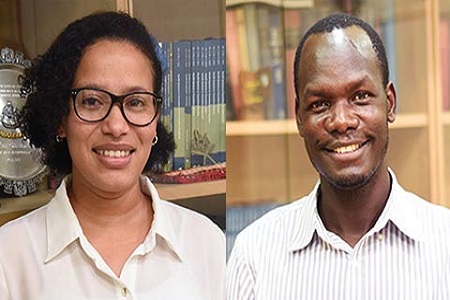
Samuel Okot was 13 when rebel soldiers from the feared Lord’s Resistance Army (LRA) broke into his home in Uganda and kidnapped him. The 30,000 child soldiers conscripted by the LRA were brutalized and forced to become murderers. A week into the ordeal, Okot managed to escape.
Rosa Capellan was orphaned at 3 years of age and placed in a church orphanage in the Dominican Republic.
Never could these two youngsters have imagined that when they grew up, they would study to become public health experts in the prestigious International Master of Public Health (IMPH) program at the Hebrew University-Hadassah Braun School of Public Health and Community Medicine.
Dr. Capellan, whose medical education was paid for by her church, and environmental health officer Okot are among 21 of this year’s IMPH students from some 18 countries. Most of them come from low-income states, including emerging economies. They are studying together with economists, social scientists, and others from various disciplines who are interested in public health.
As an environmental health officer, Okot, working in his native region, moved from one remote village to another teaching residents how to avoid malaria, HIV/AIDS, and other diseases and infections. Speaking about his experience in Israel, he says, “The diversity in both the hospital and our program is so important. The hospital is multicultural, with Ethiopians, Russians, and others. In our program, with so many participants from different countries, we learn a lot from each other.”
The IMPH program offers academic programming coupled with real-life medical training. “What I hear emphasized in this program is the importance of community awareness, community mobilization, and community participation,” says Dr. Capellan. “This is something that has to be implemented in the Dominican Republic. We need to work with the people, not just instruct them to do this or that. The program has given us the skills to intervene.”
The IMPH program includes courses in epidemiology, research methods, and biostatistics. The students, expected to become leaders, learn administration, economics, health systems, and evaluation. They also become acquainted with Hadassah’s research, a specialty of both the Hebrew University and the Hadassah Medical Organization.
“Graduates of our program hold high positions in the World Health Organization and become health ministers in their countries,” relates IMPH program director Prof. Ronit Calderon-Margalit, for whom the IMPH program is a source of pride. “They leave their jobs and families and live in dorms just so they can study intensively. They also learn about Israel and become positive ambassadors for our country.”
